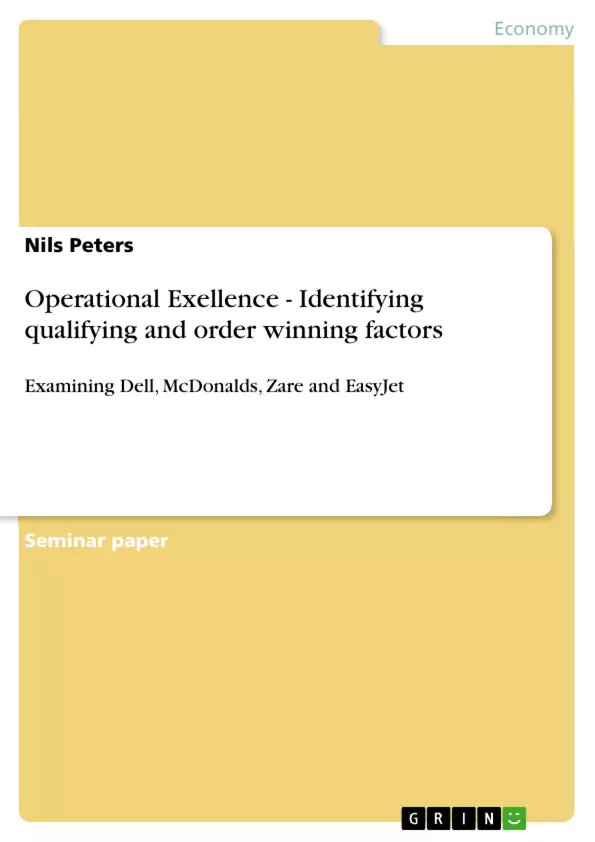Following the concept of value disciplines (Treacy, 1993), companies can reach leadership positions in their industries by focusing on one of the three following areas:
- Product Leadership
- Customer Intimacy
- Operational Excellence
Focusing on companies which are well known for their success based on operational excellence, goal of this paper is to compare and contrast the operation strategies of two manufacturing and two service firms:
• easyJet (service)
• Dell (manufacturer)
• Zara (manufacturer)
• McDonald’s (service)
Inhaltsverzeichnis (Table of Contents)
- I. INTRODUCTION
- 1. Portray of easyJet
- 2. Portray of Zara
- 3. Portray of McDonald's
- 4. Portray of Dell
- II. MARKET REQUIREMENTS AND COMPETITIVE FACTORS
- 1. easyJet
- 2. Zara
- 3. McDonald's
- 4. Dell
- III. ANALYSIS
- 1. Supply Chain
- 2. Capacity Planning and Control
- 3. Human Resources
- 4. Innovation
- 5. Quality
- IV. EVALUATION
- 1. easyJet
- 2. Zara
- 3. McDonald's
- 4. Dell
- 5. Success Factors
- V. References
- 1. Table of figures
- 2. Literature
Zielsetzung und Themenschwerpunkte (Objectives and Key Themes)
This paper aims to compare and contrast the operational strategies of two manufacturing firms (Zara and Dell) and two service firms (easyJet and McDonald's) by applying the concept of value disciplines. The paper examines the companies' approaches to achieving operational excellence by focusing on cost management and operational effectiveness to deliver services and products at the lowest cost and least inconvenience. Key themes explored in this paper include:- Operational excellence as a value discipline
- Supply chain management strategies
- Capacity planning and control in different industries
- Human resources management in operational excellence
- Innovation and its role in achieving operational excellence
Zusammenfassung der Kapitel (Chapter Summaries)
The paper begins with an introduction that presents the concept of value disciplines and introduces the four companies being analyzed. It then delves into the market requirements and competitive factors for each company, providing context for their operational strategies. Chapter III analyzes the companies' operations from various perspectives, including their supply chain management strategies, capacity planning and control methods, human resources management, innovation approaches, and quality management systems. Chapter IV evaluates the operational strategies of each company, discussing their strengths, weaknesses, and success factors. Please note that the paper's conclusion and final chapter are not included in this preview to avoid revealing major conclusions or spoilers.Schlüsselwörter (Keywords)
The paper focuses on operational excellence as a value discipline, analyzing its application in the context of four companies – easyJet, Zara, McDonald’s, and Dell. Key terms and concepts examined include supply chain management, capacity planning, human resources, innovation, quality, and the operational strategies employed by each company.Frequently Asked Questions
What is "Operational Excellence" as a value discipline?
It is a strategic focus where companies aim to lead their industry by providing products or services at the lowest cost and with the least inconvenience to the customer.
Which companies are analyzed in this paper?
The paper compares two manufacturing firms (Zara and Dell) and two service firms (easyJet and McDonald’s).
How does Zara achieve operational excellence?
Zara focuses on a highly responsive supply chain and rapid innovation to bring new fashion trends to market quickly and efficiently.
What are "qualifying" and "order-winning" factors?
Qualifying factors are minimum requirements to enter a market, while order-winning factors are the specific competitive advantages that convince customers to choose one company over another.
What role does Human Resources play in operational excellence?
In firms like McDonald’s or easyJet, HR is crucial for standardized training and performance management to ensure consistent quality and low operational costs.
- Arbeit zitieren
- Nils Peters (Autor:in), 2009, Operational Exellence - Identifying qualifying and order winning factors, München, GRIN Verlag, https://www.grin.com/document/179418



